
List of Presidents of China
Encyclopedia
List of Presidents of the ROC
This is a list of the Presidents of the Republic of ChinaPresident of the Republic of China
The President of the Republic of China is the head of state and commander-in-chief of the Republic of China . The Republic of China was founded on January 1, 1912, to govern all of China...
(1912–present). The Republic of China
Republic of China
The Republic of China , commonly known as Taiwan , is a unitary sovereign state located in East Asia. Originally based in mainland China, the Republic of China currently governs the island of Taiwan , which forms over 99% of its current territory, as well as Penghu, Kinmen, Matsu and other minor...
is now commonly known as "Taiwan" due to the Taiwan
Taiwan
Taiwan , also known, especially in the past, as Formosa , is the largest island of the same-named island group of East Asia in the western Pacific Ocean and located off the southeastern coast of mainland China. The island forms over 99% of the current territory of the Republic of China following...
currently making up almost all of its de-facto territory. The Republic of China President is called 總統 (zǒngtǒng), and from 1912–1928, 大總統 (dàzǒngtǒng).
All the names on this list follow the Oriental convention with the family name first and given name second.
| # | President | Took office | Left office | Party | Vice President | Term | ||
|---|---|---|---|---|---|---|---|---|
| Name | Portrait | |||||||
| Provisional Government Provisional Government of the Republic of China (1912) The Provisional Government of the Republic of China was a provisional government established during the Xinhai Revolution by the revolutionaries in 1912... (January 1, 1912 - October 10, 1913) |
||||||||
| 1 | Sun Yat-sen Sun Yat-sen Sun Yat-sen was a Chinese doctor, revolutionary and political leader. As the foremost pioneer of Nationalist China, Sun is frequently referred to as the "Father of the Nation" , a view agreed upon by both the People's Republic of China and the Republic of China... 孫文 (孙文) Sūn Wén 1866–1925 |
January 1, 1912 | April 1, 1912 | Tongmenghui Tongmenghui The Tongmenghui, also known as the Chinese United League, United League, Chinese Revolutionary Alliance, Chinese Alliance and United Allegiance Society, was a secret society and underground resistance movement formed when merging many Chinese revolutionary groups together by Sun Yat-sen, Song... |
Li Yuanhong Li Yuanhong Li Yuanhong was a Chinese general and political figure during the Qing dynasty and the republican era. He was twice president of the Republic of China.- Early history :... |
— | ||
| 2 | Yuan Shikai Yuan Shikai Yuan Shikai was an important Chinese general and politician famous for his influence during the late Qing Dynasty, his role in the events leading up to the abdication of the last Qing Emperor of China, his autocratic rule as the second President of the Republic of China , and his short-lived... 袁世凱 (袁世凯) Yuán Shìkǎi 1859–1915 |
 |
March 10, 1912 | October 10, 1913 | Beiyang clique | Li Yuanhong Li Yuanhong Li Yuanhong was a Chinese general and political figure during the Qing dynasty and the republican era. He was twice president of the Republic of China.- Early history :... |
— | |
| Beiyang Government Beiyang Government The Beiyang government or warlord government collectively refers to a series of military regimes that ruled from Beijing from 1912 to 1928 at Zhongnanhai. It was internationally recognized as the legitimate Government of the Republic of China. The name comes from the Beiyang Army which dominated... (October 10, 1913 - June 2, 1928) |
||||||||
| 1 | Yuan Shikai Yuan Shikai Yuan Shikai was an important Chinese general and politician famous for his influence during the late Qing Dynasty, his role in the events leading up to the abdication of the last Qing Emperor of China, his autocratic rule as the second President of the Republic of China , and his short-lived... 袁世凱 (袁世凯) Yuán Shìkǎi 1859–1915 |
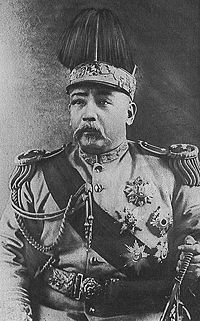 |
October 10, 1913 | June 6, 1916 | Beiyang clique | Li Yuanhong Li Yuanhong Li Yuanhong was a Chinese general and political figure during the Qing dynasty and the republican era. He was twice president of the Republic of China.- Early history :... |
1 | |
| 2 | Li Yuanhong Li Yuanhong Li Yuanhong was a Chinese general and political figure during the Qing dynasty and the republican era. He was twice president of the Republic of China.- Early history :... 黎元洪 Lí Yuánhóng 1864–1928 |
June 7, 1916 | July 17, 1917 | Progressive Progressive Party (China) - Origins :Chinese constitutionalism was a movement that originated after the First Sino-Japanese War . A young group of intellectuals in China led by Kang Youwei argued that China's defeat was due to its lack of modern institutions and legal framework which the Self-Strengthening Movement had... |
Feng Guozhang Feng Guozhang Féng Guózhāng, was a key Beiyang Army general and politician in early republican China. He held the office of Vice-President and then President of the Republic of China... |
|||
| 3 | Feng Guozhang Feng Guozhang Féng Guózhāng, was a key Beiyang Army general and politician in early republican China. He held the office of Vice-President and then President of the Republic of China... 馮國璋 (冯国璋) Féng Guózhāng 1859–1919 |
 |
July 17, 1917 | October 10, 1918 | Zhili clique | vacant | ||
| 4 | Xu Shichang 徐世昌 Xú Shìchāng 1855–1939 |
 |
October 10, 1918 | June 2, 1922 | Anhui clique Anhui clique The Anhui clique was one of several mutually hostile cliques or factions that split from the Beiyang Clique in the Republic of China's Warlord era. It was named after Anhui province because several of its generals including its founder, Duan Qirui, was born in Anhui... |
vacant | 2 | |
| - | Zhou Ziqi Zhou Ziqi Zhōu Zìqí 周自齊 , was a Chinese politician in the late Qing dynasty and early republican period. He was a member of the Communications Clique.-Biography:... 周自齊 Zhōu Zìqí 1871–1923 (acting) |
 |
June 2, 1922 | June 11, 1922 | Communications Clique Communications Clique The Communications Clique was a powerful interest group of politicians, bureaucrats, technocrats, businessmen, engineers, and labour unionists in China's Beiyang government . It is also known as the Cantonese Clique because many of its leaders hail from Guangdong... |
vacant | ||
| 5 | Li Yuanhong Li Yuanhong Li Yuanhong was a Chinese general and political figure during the Qing dynasty and the republican era. He was twice president of the Republic of China.- Early history :... 黎元洪 Lí Yuánhóng 1864–1928 |
June 11, 1922 | June 13, 1923 | Research Clique | vacant | |||
| - | Gao Lingwei Gao Lingwei Gāo Língwèi was a Chinese politician during the late Qing dynasty and the Republic of China.A Tianjin native, he was appointed to Hubei where he held many offices relating to finance and education including a stint as superintendent of the provincial military academy... 高凌霨 Gāo Língwèi 1868–1939 (acting) |
 |
June 14, 1923 | October 10, 1923 | — | vacant | ||
| 6 | Cao Kun Cao Kun |-... 曹錕 (曹锟) Cáo Kūn 1862–1938 |
 |
October 10, 1923 | November 2, 1924 | Zhili clique | vacant | 3 | |
| - | Huang Fu Huang Fu Huáng Fú was a general and politician in early republican China. He was born in Hangzhou.-Biography:Huang studied at Zhejiang Military College and Qiushi Academy , later went to Japan. Huang came in contact with the Revolutionary Alliance while studying in a military academy in the Empire of Japan... 黃郛 Huáng Fú 1883–1936 (acting) |
 |
November 2, 1924 | November 24, 1924 | — | vacant | ||
| - | Duan Qirui Duan Qirui Duan Qirui was a Chinese warlord and politician, commander in the Beiyang Army, and the Provisional Chief Executive of Republic of China from November 24, 1924 to April 20, 1926. He was arguably the most powerful man in China from 1916 to 1920.- Early life :Born in Hefei as Duan Qirui , his... 段祺瑞 Duàn Qíruì 1865–1936 (acting) |
 |
November 24, 1924 | April 20, 1926 | Anhui clique Anhui clique The Anhui clique was one of several mutually hostile cliques or factions that split from the Beiyang Clique in the Republic of China's Warlord era. It was named after Anhui province because several of its generals including its founder, Duan Qirui, was born in Anhui... |
vacant | ||
| - | Hu Weide Hu Weide rightHú Wéidé , , was a Chinese politician and diplomat during the Qing dynasty and the Republic of China.-Biography:... 胡惟德 Hú Wéidé 1863–1933 (acting) |
 |
April 20, 1926 | May 13, 1926 | — | vacant | ||
| - | Yan Huiqing Yan Huiqing Yan Huiqing Yan Huiqing Yan Huiqing (Wade-Giles: Yen Hui-Ching, (also known as W.W. Yen) 顏惠慶 (1877-1950) was a Chinese writer, politician, and diplomat from Shanghai.-Biography:... 顏惠慶 Yán Huìqìng 1877–1950 (acting) |
May 13, 1926 | June 22, 1926 | — | vacant | |||
| - | Du Xigui Du Xigui Du Xigui was a Chinese admiral during the warlord era.-Biography:Born in Fuzhou, he graduated from Nanjing's naval college in 1902. In 1922, he was made chief of the navy and helped the Zhili clique defeat Zhang Zuolin. In the spring of 1923, Shanghai's fleet rebelled and Du took responsibility... 杜錫珪 Dù Xīguī 1875–1933 (acting) |
 |
June 22, 1926 | October 1, 1926 | Zhili clique | vacant | ||
| - | Koo Vi-kyuin (V.K. Wellington Koo) 顧維鈞 (顾维钧) Gù Wéijūn 1887–1985 (acting) |
 |
October 1, 1926 | June 17, 1927 | — | vacant | ||
| - | Zhang Zuolin Zhang Zuolin Zhang Zuolin was the warlord of Manchuria from 1916 to 1928 . He successfully invaded China proper in October 1924 in the Second Zhili-Fengtian War. He gained control of Peking, including China's internationally recognized government, in April 1926... 張作霖 Zhāng Zuòlín 1875–1928 (acting) |
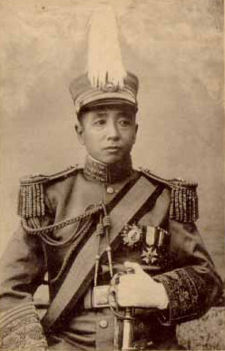 |
June 18, 1927 | June 2, 1928 | Fengtian clique Fengtian clique The Fengtian Clique was one of several mutually hostile cliques or factions that split from the Beiyang Clique in the Republic of China's warlord era. It was named for Fengtian Province and led by Zhang Zuolin... |
vacant | ||
| Post abolished: June 2, 1928 - October 10, 1928 Nationalist Government (October 10, 1928 - May 20, 1948) | ||||||||
| - | Chiang Kai-shek Chiang Kai-shek Chiang Kai-shek was a political and military leader of 20th century China. He is known as Jiǎng Jièshí or Jiǎng Zhōngzhèng in Mandarin.... 蔣中正 (蒋中正) Jiǎng Zhōngzhèng 1887–1975 |
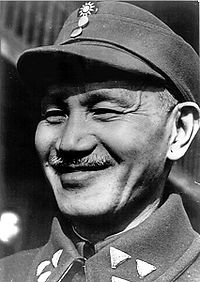 |
October 10, 1928 | December 15, 1931 | Kuomintang Kuomintang The Kuomintang of China , sometimes romanized as Guomindang via the Pinyin transcription system or GMD for short, and translated as the Chinese Nationalist Party is a founding and ruling political party of the Republic of China . Its guiding ideology is the Three Principles of the People, espoused... |
— | — | |
| - | Lin Sen Lin Sen Lin Sen , courtesy name Zichao , sobriquet Changren , was President of the National Government of the Republic of China from 1931 until his death.-Early life:... 林森 Lín Sēn 1868–1943 |
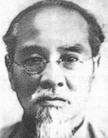 |
December 15, 1931 | August 1, 1943 | Kuomintang Kuomintang The Kuomintang of China , sometimes romanized as Guomindang via the Pinyin transcription system or GMD for short, and translated as the Chinese Nationalist Party is a founding and ruling political party of the Republic of China . Its guiding ideology is the Three Principles of the People, espoused... |
— | — | |
| - | Chiang Kai-shek Chiang Kai-shek Chiang Kai-shek was a political and military leader of 20th century China. He is known as Jiǎng Jièshí or Jiǎng Zhōngzhèng in Mandarin.... 蔣中正 (蒋中正) Jiǎng Zhōngzhèng 1887–1975 |
 |
August 1, 1943 | May 20, 1948 | Kuomintang Kuomintang The Kuomintang of China , sometimes romanized as Guomindang via the Pinyin transcription system or GMD for short, and translated as the Chinese Nationalist Party is a founding and ruling political party of the Republic of China . Its guiding ideology is the Three Principles of the People, espoused... |
— | — | |
| After 1947 Constitution Constitution of the Republic of China The Constitution of the Republic of China is the fundamental law of the Republic of China . Drafted by the Kuomintang as part of its third stage of national development , it established a centralized Republic with five branches of government... (May 20, 1948 - May 20, 1996) |
||||||||
| 1 | Chiang Kai-shek Chiang Kai-shek Chiang Kai-shek was a political and military leader of 20th century China. He is known as Jiǎng Jièshí or Jiǎng Zhōngzhèng in Mandarin.... 蔣中正 (蒋中正) Jiǎng Zhōngzhèng 1887–1975 |
 |
May 20, 1948 | January 21, 1949 | Kuomintang Kuomintang The Kuomintang of China , sometimes romanized as Guomindang via the Pinyin transcription system or GMD for short, and translated as the Chinese Nationalist Party is a founding and ruling political party of the Republic of China . Its guiding ideology is the Three Principles of the People, espoused... |
Li Zongren Li Zongren Li Zongren or Li Tsung-jen , courtesy name Delin , was a prominent Guangxi warlord and Kuomintang military commander during the Northern Expedition, Second Sino-Japanese War and Chinese Civil War... |
1 | |
| Li Zongren Li Zongren Li Zongren or Li Tsung-jen , courtesy name Delin , was a prominent Guangxi warlord and Kuomintang military commander during the Northern Expedition, Second Sino-Japanese War and Chinese Civil War... 李宗仁 Li Zōngrén 1890–1969 (acting) |
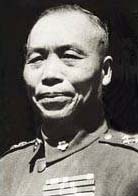 |
January 21, 1949 | March 1, 1950 | Kuomintang Kuomintang The Kuomintang of China , sometimes romanized as Guomindang via the Pinyin transcription system or GMD for short, and translated as the Chinese Nationalist Party is a founding and ruling political party of the Republic of China . Its guiding ideology is the Three Principles of the People, espoused... |
vacant | |||
| Chiang Kai-shek Chiang Kai-shek Chiang Kai-shek was a political and military leader of 20th century China. He is known as Jiǎng Jièshí or Jiǎng Zhōngzhèng in Mandarin.... 蔣中正 (蒋中正) Jiǎng Zhōngzhèng 1887–1975 |
 |
March 1, 1950 | May 20, 1954 | Kuomintang Kuomintang The Kuomintang of China , sometimes romanized as Guomindang via the Pinyin transcription system or GMD for short, and translated as the Chinese Nationalist Party is a founding and ruling political party of the Republic of China . Its guiding ideology is the Three Principles of the People, espoused... |
Li Zongren Li Zongren Li Zongren or Li Tsung-jen , courtesy name Delin , was a prominent Guangxi warlord and Kuomintang military commander during the Northern Expedition, Second Sino-Japanese War and Chinese Civil War... |
|||
| May 20, 1954 | May 20, 1960 | Chen Cheng Chen Cheng Chen Cheng , was a Chinese political and military leader, and one of the main National Revolutionary Army commanders during the Second Sino-Japanese War and the Chinese Civil War. After moving to Taiwan at the end of the Civil War, he served as the Governor of Taiwan Province, Vice President and... |
2 | |||||
| May 20, 1960 | May 20, 1966 | 3 | ||||||
| vacant | ||||||||
| May 20, 1966 | May 20, 1972 | Yen Chia-kan Yen Chia-kan Yen Chia-kan , or Yen Chia-jin , better known as C. K. Yen, succeeded Chiang Kai-shek as President of the Republic of China upon Chiang's death on April 5, 1975. He served out the remainder of Chiang's term until May 20, 1978.-Biography:C. K... |
4 | |||||
| May 20, 1972 | April 5, 1975 | 5 | ||||||
| 2 | Yen Chia-kan Yen Chia-kan Yen Chia-kan , or Yen Chia-jin , better known as C. K. Yen, succeeded Chiang Kai-shek as President of the Republic of China upon Chiang's death on April 5, 1975. He served out the remainder of Chiang's term until May 20, 1978.-Biography:C. K... 嚴家淦 (严家淦) Yán Jiāgàn 1905–1993 |
April 6, 1975 | May 20, 1978 | Kuomintang Kuomintang The Kuomintang of China , sometimes romanized as Guomindang via the Pinyin transcription system or GMD for short, and translated as the Chinese Nationalist Party is a founding and ruling political party of the Republic of China . Its guiding ideology is the Three Principles of the People, espoused... |
vacant | |||
| 3 | Chiang Ching-kuo Chiang Ching-kuo Chiang Ching-kuo , Kuomintang politician and leader, was the son of President Chiang Kai-shek and held numerous posts in the government of the Republic of China... 蔣經國 (蒋经国) Jiǎng Jīngguó 1910–1988 |
May 20, 1978 | May 20, 1984 | Kuomintang Kuomintang The Kuomintang of China , sometimes romanized as Guomindang via the Pinyin transcription system or GMD for short, and translated as the Chinese Nationalist Party is a founding and ruling political party of the Republic of China . Its guiding ideology is the Three Principles of the People, espoused... |
Hsieh Tung-min | 6 | ||
| May 20, 1984 | January 13, 1988 | Lee Teng-hui Lee Teng-hui Lee Teng-hui is a politician of the Republic of China . He was the 7th, 8th, and 9th-term President of the Republic of China and Chairman of the Kuomintang from 1988 to 2000. He presided over major advancements in democratic reforms including his own re-election which marked the first direct... |
7 | |||||
| 4 | Lee Teng-hui Lee Teng-hui Lee Teng-hui is a politician of the Republic of China . He was the 7th, 8th, and 9th-term President of the Republic of China and Chairman of the Kuomintang from 1988 to 2000. He presided over major advancements in democratic reforms including his own re-election which marked the first direct... 李登輝 (李登辉) Li Dēnghuī 1923– |
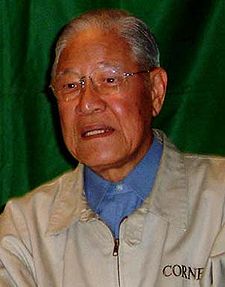 |
January 13, 1988 | May 20, 1990 | Kuomintang Kuomintang The Kuomintang of China , sometimes romanized as Guomindang via the Pinyin transcription system or GMD for short, and translated as the Chinese Nationalist Party is a founding and ruling political party of the Republic of China . Its guiding ideology is the Three Principles of the People, espoused... |
vacant | ||
| May 20, 1990 | May 20, 1996 | Li Yuan-zu | 8 | |||||
| Direct Democratic Election (May 20, 1996–present) | ||||||||
| May 20, 1996 | May 20, 2000 | Kuomintang Kuomintang The Kuomintang of China , sometimes romanized as Guomindang via the Pinyin transcription system or GMD for short, and translated as the Chinese Nationalist Party is a founding and ruling political party of the Republic of China . Its guiding ideology is the Three Principles of the People, espoused... |
Lien Chan Lien Chan Lien Chan is a politician in Taiwan. He was Premier of the Republic of China from 1993 to 1997, Vice President of the Republic of China from 1996 to 2000, and was the Chairman of the Kuomintang from 2000 to 2005... |
9 | ||||
| 5 | Chen Shui-bian Chen Shui-bian Chen Shui-bian is a former Taiwanese politician who was the 10th and 11th-term President of the Republic of China from 2000 to 2008. Chen, whose Democratic Progressive Party has traditionally been supportive of Taiwan independence, ended more than fifty years of Kuomintang rule in Taiwan... 陳水扁 (陈水扁) Chén Shuǐbiǎn 1950– |
May 20, 2000 | May 20, 2004 | Democratic Progressive Democratic Progressive Party The Democratic Progressive Party is a political party in Taiwan, and the dominant party in the Pan-Green Coalition. Founded in 1986, DPP is the first meaningful opposition party in Taiwan. It has traditionally been associated with strong advocacy of human rights and a distinct Taiwanese identity,... |
Lu Hsiu-lien (Annette Lu) Annette Lu Annette Lu Hsiu-lien , was the Vice President of the Republic of China from 2000 to 2008, under Chen Shui-bian. She announced her intentions to run for President of Taiwan on March 6, 2007, but withdrew in order to support DPP presidential nominee, Frank Hsieh... |
10 | ||
| May 20, 2004 | May 20, 2008 | 11 | ||||||
| 6 | Ma Ying-jeou Ma Ying-jeou Ma Ying-jeou is the 12th term and current President of the Republic of China , commonly known as Taiwan, and the Chairman of the Kuomintang Party, also known as the Chinese Nationalist Party. He formerly served as Justice Minister from 1993 to 1996, Mayor of Taipei from 1998 to 2006, and Chairman... 馬英九 (马英九) Mǎ Yīngjiǔ 1950– |
 |
May 20, 2008 | Incumbent Incumbent The incumbent, in politics, is the existing holder of a political office. This term is usually used in reference to elections, in which races can often be defined as being between an incumbent and non-incumbent. For example, in the 2004 United States presidential election, George W... (Term expires May 20, 2012) |
Kuomintang Kuomintang The Kuomintang of China , sometimes romanized as Guomindang via the Pinyin transcription system or GMD for short, and translated as the Chinese Nationalist Party is a founding and ruling political party of the Republic of China . Its guiding ideology is the Three Principles of the People, espoused... |
Siew Wan-chang (Vincent Siew) Vincent Siew Vincent C. Siew Wan-chang is the incumbent Vice President of the Republic of China. He was the first Taiwanese-born Premier of the Republic of China and former vice-chairman of the Kuomintang .-Biography:... |
12 | |
List of Presidents of the PRC
This is a list of all the Chairmen of the People's Republic of China (1954-1975) and the Presidents of the People's Republic of ChinaPresident of the People's Republic of China
The President of the People's Republic of China is a ceremonial office and a part of State organs under the National People's Congress and it is the head of state of the People's Republic of China . The office was created by the 1982 Constitution...
(1982-present). The President of the PRC is called 主席 (zhǔxí), formerly translated as Chairman.
To avoid confusion, all the names on this list follow the Oriental convention (family name first, given name second) for consistency.
Generations of leadership
Generations of Chinese leadership
Because both the Communist Party of China and the People's Liberation Army promote according to seniority, it is possible to discern distinct generations of Chinese leadership...
:
| № | Portrait | Presidents | Term | Term of office | Vice Presidents | |
|---|---|---|---|---|---|---|
| 1 | Mao Zedong Mao Zedong Mao Zedong, also transliterated as Mao Tse-tung , and commonly referred to as Chairman Mao , was a Chinese Communist revolutionary, guerrilla warfare strategist, Marxist political philosopher, and leader of the Chinese Revolution... 毛泽东(毛澤東) (1893–1976) Beijing Beijing Beijing , also known as Peking , is the capital of the People's Republic of China and one of the most populous cities in the world, with a population of 19,612,368 as of 2010. The city is the country's political, cultural, and educational center, and home to the headquarters for most of China's... At-large |
CP Constitutional history of the People's Republic of China The Constitutional history of the People's Republic of China describes the evolution of its Constitutional system. The first Constitution of the People's Republic of China was promulgated in 1954. After two intervening versions enacted in 1975 and 1978, the current Constitution was promulgated in... |
1 October 1949 (acting) |
27 September 1954 |
Zhu De Zhu De Zhu De was a Chinese militarist, politician, revolutionary, and one of the pioneers of the Chinese Communist Party. After the founding of the People's Republic of China, in 1955 Zhu became one of the Ten Marshals of the People's Liberation Army, of which he is regarded as the founder.-Early... Liu Shaoqi Liu Shaoqi Liu Shaoqi was a Chinese revolutionary, statesman, and theorist. He was Chairman of the People's Republic of China, China's head of state, from 27 April 1959 to 31 October 1968, during which he implemented policies of economic reconstruction in China... Song Qingling Zhang Lan Zhang Lan Zhang Lan , courtesy name Biaofang, was a Chinese political activist best known for being the chairman of the China Democratic League from its founding in 1941 until 1955.-Biography:Zhang was born into a scholarly family in Nanchong, Sichuan in 1872... Li Jishen Li Jishen Li Jishen was a Chinese military commander and statesman. He served as commander of the Fourth Army of the Republic of China, governor of Guangdong, military affairs commissioner, and acting president of the Whampoa Military Academy... Gao Gang Gao Gang Gao Gang was a Chinese Communist Party leader during the Chinese Civil War and the early years of the People's Republic of China , before becoming the victim of the first major purge within the CCP since before 1949... |
|
| 1 1st National People's Congress The 1st National People's Congress was in session from 1954 to 1959. It held four plenary sessions in this period. There were 1226 deputies to the Congress.... |
27 September 1954 |
27 April 1959 |
Zhu De Zhu De Zhu De was a Chinese militarist, politician, revolutionary, and one of the pioneers of the Chinese Communist Party. After the founding of the People's Republic of China, in 1955 Zhu became one of the Ten Marshals of the People's Liberation Army, of which he is regarded as the founder.-Early... |
|||
| 2 | 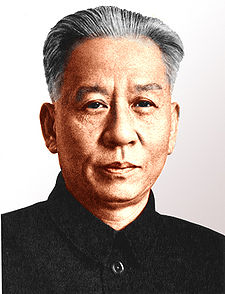 |
Liu Shaoqi Liu Shaoqi Liu Shaoqi was a Chinese revolutionary, statesman, and theorist. He was Chairman of the People's Republic of China, China's head of state, from 27 April 1959 to 31 October 1968, during which he implemented policies of economic reconstruction in China... 刘少奇(劉少奇) (1898–1969) Beijing Beijing Beijing , also known as Peking , is the capital of the People's Republic of China and one of the most populous cities in the world, with a population of 19,612,368 as of 2010. The city is the country's political, cultural, and educational center, and home to the headquarters for most of China's... At-large |
2 2nd National People's Congress The 2nd National People's Congress was in session from 1959 to 1964. It held four plenary sessions in this period.The first plenary session was held in April 1959... |
27 April 1959 |
21 December 1964 |
Song Qingling Dong Biwu Dong Biwu Dong Biwu was a Chinese communist political leader during the regime of Mao Zedong.-Biography:Dong Biwu was born in Huanggang, Hubei. He was the President of China from 1948 to 1949 and Acting President from 1968 until 17 January 1975 when Zhu De became the succeeding Chairman of the Standing... |
| 3 3rd National People's Congress The 3rd National People's Congress was in session from 1964 to 1975. It held only one plenary session in the ten years.The plenary session was held from December 21, 1964 to January 4, 1965... |
21 December 1964 |
31 October 1968 (ousted) |
||||
| — | 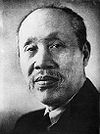 |
Song Qingling Soong Ching-ling Soong Ching-ling , also known as Madame Sun Yat-sen, was one of the three Soong sisters—who, along with their husbands, were amongst China's most significant political figures of the early 20th century. She was the Vice Chairman of the People's Republic of China... 宋庆龄(宋慶齡) (1893–1981) Shanghai Shanghai Shanghai is the largest city by population in China and the largest city proper in the world. It is one of the four province-level municipalities in the People's Republic of China, with a total population of over 23 million as of 2010... At-large ---- Dong Biwu Dong Biwu Dong Biwu was a Chinese communist political leader during the regime of Mao Zedong.-Biography:Dong Biwu was born in Huanggang, Hubei. He was the President of China from 1948 to 1949 and Acting President from 1968 until 17 January 1975 when Zhu De became the succeeding Chairman of the Standing... 董必武 (1886-1975) Hubei Hubei ' Hupeh) is a province in Central China. The name of the province means "north of the lake", referring to its position north of Lake Dongting... At-large |
3 2nd National People's Congress The 2nd National People's Congress was in session from 1959 to 1964. It held four plenary sessions in this period.The first plenary session was held in April 1959... (cont) |
31 October 1968 (acting) |
24 February 1972 (resigned) ---- 17 January 1975 |
vacant |
| * | as NPCSC Chairman ---- Zhu De Zhu De Zhu De was a Chinese militarist, politician, revolutionary, and one of the pioneers of the Chinese Communist Party. After the founding of the People's Republic of China, in 1955 Zhu became one of the Ten Marshals of the People's Liberation Army, of which he is regarded as the founder.-Early... 朱德 (1898–1969) Sichuan Sichuan ' , known formerly in the West by its postal map spellings of Szechwan or Szechuan is a province in Southwest China with its capital in Chengdu... At-large |
4 4th National People's Congress The 4th National People's Congress was in session from 1975 to 1978. It held only one plenary sessions in January 1975. There were 2864 deputies to this Congress.The Congress passed the 1975 Constitution of the People's Republic of China.... |
17 January 1975 |
6 July 1976 (died in office) |
vacant | |
| * | as NPCSC Chairman ---- Song Qingling Soong Ching-ling Soong Ching-ling , also known as Madame Sun Yat-sen, was one of the three Soong sisters—who, along with their husbands, were amongst China's most significant political figures of the early 20th century. She was the Vice Chairman of the People's Republic of China... 宋庆龄(宋慶齡) (1893–1981) Shanghai Shanghai Shanghai is the largest city by population in China and the largest city proper in the world. It is one of the four province-level municipalities in the People's Republic of China, with a total population of over 23 million as of 2010... At-large |
4 4th National People's Congress The 4th National People's Congress was in session from 1975 to 1978. It held only one plenary sessions in January 1975. There were 2864 deputies to this Congress.The Congress passed the 1975 Constitution of the People's Republic of China.... (cont) |
6 July 1976 |
5 March 1978 |
vacant | |
| * | as NPCSC Chairman ---- Ye Jianying Ye Jianying Ye Jianying was a Chinese communist general and the chairman of the Standing Committee of the National People's Congress from 1978 to 1983.-Biography:... 叶剑英(葉劍英) (1897–1986) Guangdong Guangdong Guangdong is a province on the South China Sea coast of the People's Republic of China. The province was previously often written with the alternative English name Kwangtung Province... At-large (54-59) PLA People's Liberation Army The People's Liberation Army is the unified military organization of all land, sea, strategic missile and air forces of the People's Republic of China. The PLA was established on August 1, 1927 — celebrated annually as "PLA Day" — as the military arm of the Communist Party of China... At-large (59-83) |
5 5th National People's Congress The 5th National People's Congress was in session from 1978 to 1983. It held five plenary sessions in this period.The Congress passed the 1978 Constitution of the People's Republic of China and the current Constitution of the People's Republic of China in 1982.-Elected state leaders:*Chairman of... |
5 March 1978 |
16 May 1981 |
vacant | |
| — | as Honorary President ---- Song Qingling Soong Ching-ling Soong Ching-ling , also known as Madame Sun Yat-sen, was one of the three Soong sisters—who, along with their husbands, were amongst China's most significant political figures of the early 20th century. She was the Vice Chairman of the People's Republic of China... 宋庆龄(宋慶齡) (1893–1981) Shanghai Shanghai Shanghai is the largest city by population in China and the largest city proper in the world. It is one of the four province-level municipalities in the People's Republic of China, with a total population of over 23 million as of 2010... At-large |
5 5th National People's Congress The 5th National People's Congress was in session from 1978 to 1983. It held five plenary sessions in this period.The Congress passed the 1978 Constitution of the People's Republic of China and the current Constitution of the People's Republic of China in 1982.-Elected state leaders:*Chairman of... (cont) |
16 May 1981 |
28 May 1981 |
vacant | |
| * | as NPCSC Chairman ---- Ye Jianying Ye Jianying Ye Jianying was a Chinese communist general and the chairman of the Standing Committee of the National People's Congress from 1978 to 1983.-Biography:... 叶剑英(葉劍英) (1897–1986) Guangdong Guangdong Guangdong is a province on the South China Sea coast of the People's Republic of China. The province was previously often written with the alternative English name Kwangtung Province... At-large (54-59) PLA People's Liberation Army The People's Liberation Army is the unified military organization of all land, sea, strategic missile and air forces of the People's Republic of China. The PLA was established on August 1, 1927 — celebrated annually as "PLA Day" — as the military arm of the Communist Party of China... At-large (59-83) |
5 5th National People's Congress The 5th National People's Congress was in session from 1978 to 1983. It held five plenary sessions in this period.The Congress passed the 1978 Constitution of the People's Republic of China and the current Constitution of the People's Republic of China in 1982.-Elected state leaders:*Chairman of... (cont) |
28 May 1981 |
18 June 1983 |
vacant | |
| 3 | 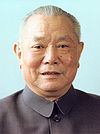 |
Li Xiannian Li Xianniàn Li Xiannian was President of the People's Republic of China between 1983 and 1988 and then chairman of the Chinese People's Political Consultative Conference until his death. He was an influential political figure throughout the PRC, having been a member of the Politburo of the Communist Party of... 李先念 (1909–1992) Hubei Hubei ' Hupeh) is a province in Central China. The name of the province means "north of the lake", referring to its position north of Lake Dongting... At-large |
6 6th National People's Congress The 6th National People's Congress was in session from 1983 to 1988. It held five plenary sessions in this period.-Elected state leaders:In the 1st Plenary Session in 1983, the Congress elected the state leaders:... |
18 June 1983 |
8 April 1988 |
Ulanhu Ulanhu Ulanhu was the founder of the Inner Mongolia Autonomous Region in China, Ulanhu had the nickname of "Mongolian Khan" during his political career.-Career:... |
| 4 | 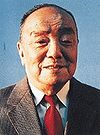 |
Yang Shangkun Yang Shangkun Yang Shangkun was President of the People's Republic of China from 1988 to 1993, and was permanent Vice-chair of the Central Military Commission... 杨尚昆(楊尚昆) (1907-1998) Sichuan Sichuan ' , known formerly in the West by its postal map spellings of Szechwan or Szechuan is a province in Southwest China with its capital in Chengdu... At-large  |
7 7th National People's Congress The 7th National People's Congress was in session from 1988 to 1993. It held five plenary sessions in this period.-Elected state leaders:In the 1st Plenary Session in 1988, the Congress elected the state leaders:... |
8 April 1988 |
27 March 1993 |
Wang Zhen Wang Zhen Wang Zhen was a Chinese political figure and one of the Eight Immortals of the Communist Party of China.-Early years:Like most Chinese communist leaders, Wang was a commander in his early years... |
| 5 | 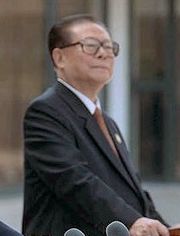 |
Jiang Zemin Jiang Zemin Jiang Zemin is a former Chinese politician, who served as General Secretary of the Communist Party of China from 1989 to 2002, as President of the People's Republic of China from 1993 to 2003, and as Chairman of the Central Military Commission from 1989 to 2005... 江泽民(江澤民) (1926-) Shanghai Shanghai Shanghai is the largest city by population in China and the largest city proper in the world. It is one of the four province-level municipalities in the People's Republic of China, with a total population of over 23 million as of 2010... At-large |
8 8th National People's Congress The 8th National People's Congress was in session from 1993 to 1998. It held five plenary sessions in this period.-Elected state leaders:In the 1st Plenary Session in 1993, the Congress elected the state leaders:... |
27 March 1993 |
15 March 1998 |
Rong Yiren Rong Yiren Rong Yiren was the Vice-President of the People's Republic of China from 1993 to 1998 and was heavily involved with the opening of the Chinese economy to western investment. It is from this second accomplishment, that the western media called him "The Red Capitalist".-Biography:Rong was born in... |
| 9 9th National People's Congress The 9th National People's Congress was in session from 1998 to 2003. It held five plenary sessions in this period. There were 2,979 deputies to this Congress.-Elected state leaders:*President of the People's Republic of China: Jiang Zemin... |
15 March 1998 |
23 March 2003 |
Hu Jintao Hu Jintao Hu Jintao is the current Paramount Leader of the People's Republic of China. He has held the titles of General Secretary of the Communist Party of China since 2002, President of the People's Republic of China since 2003, and Chairman of the Central Military Commission since 2004, succeeding Jiang... |
|||
| 6 | Hu Jintao Hu Jintao Hu Jintao is the current Paramount Leader of the People's Republic of China. He has held the titles of General Secretary of the Communist Party of China since 2002, President of the People's Republic of China since 2003, and Chairman of the Central Military Commission since 2004, succeeding Jiang... 胡锦涛(胡錦濤) (1942-) Guizhou Guizhou ' is a province of the People's Republic of China located in the southwestern part of the country. Its provincial capital city is Guiyang.- History :... At-large (88-93,98-03) Tibet Tibet Autonomous Region The Tibet Autonomous Region , Tibet or Xizang for short, also called the Xizang Autonomous Region is a province-level autonomous region of the People's Republic of China , created in 1965.... At-large (93-98,03-08) Zhejiang Zhejiang Zhejiang is an eastern coastal province of the People's Republic of China. The word Zhejiang was the old name of the Qiantang River, which passes through Hangzhou, the provincial capital... At-large (08-) |
10 10th National People's Congress The 10th National People's Congress was in session from 2003 to 2008. It held five plenary sessions in this period. There are 2,985 deputies to this Congress.-The 1st Plenary Session:The First Plenary Session was held in 2003... |
23 March 2003 |
15 March 2008 |
Zeng Qinghong Zeng Qinghong Zeng Qinghong was the Vice-President of the People's Republic of China from 2003 to 2008. He became a member of the Politburo Standing Committee and member of the Secretariat of the CPC Central Committee during the 2002 16th Party Congress. Although he was formally ranked fifth in the nine PSC... |
|
| 11 11th National People's Congress The 11th National People's Congress is in session from 2008 to 2013. It is scheduled to hold five plenary sessions in this period, occurring around early March every year. There are 2,985 deputies to this Congress.-The 1st Plenary Session:... |
15 March 2008 |
Incumbent (term expires 2013) |
Xi Jinping Xi Jinping Xi Jinping is a high ranking politician of the People's Republic of China. He currently serves as the top-ranking member of the Secretariat of the Communist Party of China, the country's Vice President, Vice-Chairman of the Central Military Commission, President of the Central Party School and the... |
|||

